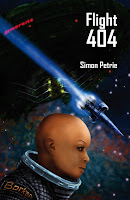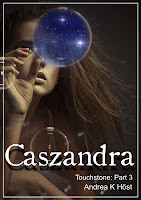This post comes now because I've reached a milestone in my challenge, of reading ten books; the goal I was aiming for. They were quite a mixed bag too, despite the ten only containing seven different authors. Although I want to read more books by almost all of them (Lisa Jacobson being the only one I'm ambivalent about, and that only because I don't particularly expect her to write more spec fic), I would also like to broaden the pool to include more authors in the remainder of the year. Especially the ones that have been sitting on my TBR shelf, waiting patiently.
Incidentally, it's interesting to note that more than half of the books I've read for this challenge were self-published. That's six books by three authors. Another one came out through a digital-only imprint and two more from Australian small-presses. The remaining book is published by an international spec fic publisher (which I think makes it medium-sized) based in the UK. I'm not suggesting that no large Australian publishers are publishing SF (that's untrue), but it seems clear that there are many other sources of Australian science fiction other than large Aussie presses. I do have a handful of other Aus SF books on my shelf, as I said, and those are all printed by large presses. But you know what? Only two of them are originally from Australian publishers and both are now out of print! (One I have a US edition of, the other I nabbed in a second hand book shop but is still in print in the US and as an ebook from the Australian publisher. Wow, that's more depressing than I realised when I started writing this paragraph.) Ouch.
But on to happier things! A little about each book that I've read for the challenge so far this year.
Hal Spacejock: Baker's Dough by Simon Haynes (review)
Hal Spacejock is the captain of a cargo ship, haphazardly delivering cargo across the galaxy. His trusty sidekick is Clunk the robot — eminently more competent at just about everything than Hal is — and the ship itself is personified via the Navcom. In this adventure Hal and Clunk stumble into the middle of a mad rush to claim an inheritance left to a robot. The catch? Because robots are reprogrammed and have their memories wiped when they're sold to a new owner, no one is entirely sure exactly which robot is supposed to be inheriting.
Rayessa and the Space Pirates by Donna Maree Hanson (review)
Rayessa and the Space Pirates was a fun read. Rayessa is gutsy but woefully undereducated through no fault of her own. She makes do on her sucky asteroid and, as one would expect, dreams of a better life. Although this novella was published by an imprint of Harlequin, it's not really a romance story.
The Sunlit Zone by Lisa Jacobson (review)
Anyway, The Sunlit Zone was overall a good if unusual read. I would recommend it to anyone looking for something different to the usual spec fic fare. I think it's worth a read purely for the way it's written [it's a verse novel] and I imagine readers who usually shy away from speculative fiction would enjoy it as literature. It's not a long read, either, and not the kind of poetry that one has to reread a few times to digest, so I do encourage you to give it a go.
Flight 404 by Simon Petrie (review)
I enjoyed both the story and the physics in Flight 404. My long-time followers will probably be aware that scientific plausibility is very important to me. There were no gaffes, which made me happy and which is just as well since Petrie works, when not writing speculative fiction, in computational quantum chemistry. It was also nice to see non-trivial sociological issues — Charmain's gender identity — tackled in a hard science fictional setting. (I've seen Bujold do similar, but I don't think it's otherwise very common.)
The next three books form the Touchstone Trilogy by Andrea K Höst. It's definitely the kind of trilogy that needs to be read in order, so if you're looking for book suggestions, start with the first of the series.
Stray by Andrea K Höst (review)
Stray is about Cass, a Sydney teenager, who falls into a wormhole to another planet on her way home from her last HSC (High School Certificate) exam. In her school uniform and equipped only with her history notes, pencil case, an empty drink bottle, and a blank diary she'd bought as a present, she finds herself in a forest, all alone. The story is told through her diary entries.
Lab Rat One by Andrea K Höst (review)
The story continues with more of [Cass's] training with the Setari — psychic space ninjas — and more discovery's of the alien people's past. As with the first book, the plot is driven in large part by things unexpectedly happening to Cass, often as part of the larger experimentation with her still mysterious powers. It gave me the inescapable feeling that she is both terribly unlucky and very lucky to still be alive. She continues to almost die a lot.
Caszandra by Andrea K Höst (review)
This book ups the danger levels and the stakes. The Setari (psychic space ninjas) and Cass were always trying to protect people but in the lead up to the conclusion, the urgency for definitive world-saving becomes extreme. And, unsurprisingly, Cass continues to almost die in new and exciting ways.
Charlotte's Army by Patty Jansen (review)
Since I first heard about it, I've found the premise of Charlotte's Army interesting: an army of artificial (clone-like) soldiers were all created with the same flaw. All of them are in love with Charlotte, one of the army's senior medical staff. I was interested to see how it would all play out and what caused the flaw. The fact that it wasn't Charlotte's fault was kind of gratifying since she was quite a likeable character.
Trader's honour by Patty Jansen (review)
Trader's Honour deals quite a bit with notions of how societies (should) work. The Mirani have two classes of people, the nobility (which includes Mikandra) and the working classes. The noble class not only limits the prospects of its women, but also believes that it's their duty to protect and care for the lower classes. As we learn quite early on, they don't do as good a job as they could. By contrast, Barresh, the other continent, is thought to be primitive and more or less useless. But when Mikandra arrives there she finds that, yes, it is very different (there's a bit of appropriate culture-shock on her part). Over time she learns that different does not mean worse, not the way the other nobles think, and starts to see a lot of potential around her. It made me think of biases against developing countries and how some are actually the world's fastest growing economies.
When the World Was Flat (And We Were in Love) by Ingrid Jonach (review)
When the World Was Flat (And We Were in Love) is about Lillie, a teenage girl in small-town USA who starts having weird and disturbing dreams in which she dies, every single night. And not just dies, is murdered by a figure in a balaclava. Her resulting unsettled demeanour gives the narrative a dream-like quality with a dark vibe that I really enjoyed. Probably my favourite thing about the first part of the book is the eeriness Jonach effectively evokes with her writing.
Incidentally, I have an interview coming with Ingrid in September, so if the above snippet and/or my review piqued your interest, stay tuned!












Thanks for the quick reviews, Tsana. I wish more people would do this kind of thing. My own reviews tend to be too long I think. Some of those books were on my own TBR list so it was especially helpful.
ReplyDeleteI did wonder why there were no books by the big-name Aussie sci-fi writers (Greg Egan, George Turner, Marianne de Pierres, Sean Williams, etc.). But maybe you've read all those already :-)
Well, those are just snippets of my much longer reviews which are linked next to the titles.
DeleteAs for the authors you mentioned— Marianne de Pierres and Sean Williams I've read some of and some more is on my TBR shelf. George Turner and Greg Egan I haven't gotten to yet. Turner partly because he's not terribly in print (a quick search leads me to believe only one of his books is easily acquired). And Egan because I keep getting him confused with Greg Bear, which is terrible as the latter wrote a hideously sexist and racist book I couldn't finish. I should add Egan more definitively to by TBR. Any suggestions of where to start? (Something spacey perhaps?)
Wow, Greg Bear sexist and racist? What was the book?
ReplyDeleteEgan is one of my all time favourite SF writers (Australian or otherwise) but he's definitely not for everybody. "Permutation City" is the book he's best known for, I suppose. "Incandescence" might count as spacey. His short story collection "Axiomatic" is a pretty painless introduction.
As for the snippet thing, it's pretty obvious now that I look back at the post, but I completely missed that this was a set of summaries the first time round! Sorry.
That thing you mentioned about big Aussie publishers leaving the sci-fi field, I particularly lament Orbit (Hachette) dropping out (their new titles for the past few years have all been fantasy as far as I'm aware). But Harper Voyager is still doing some titles and have you noticed Pan Macmillan's digital-first imprint, Momentum? (My declaration of interest goes without saying.) It's the most positive move I've seen in the Aussie sci-fi market for a long time.
The Greg Bear book was Eon. The science fictional elements were really quite good and were the only thing that made me want to keep reading, but basically no one that wasn't an American man got to be an actual person. I found that aspect too sickening and it made me very angry.
DeleteI have noticed Momentum and I've got some of their books queued up. Voyager has only had a trickle of Aussie science fiction in recent years (The Rook, this year's Aurealis winner, wasn't under the Voyager imprint). Mind you, I don't really think it's so much a case of publishers suddenly leaving SF. Publishing significantly more fantasy than SF is hardly a new development.